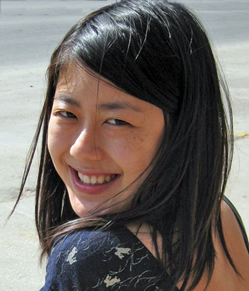|
The first stories I told were on cassette tape, recorded in the living room of my grandfather's house in Shanghai where I lived until I was five. My father left when I was three to study linguistics at NYU and live in a dorm room with seven other Chinese exchange students. (Only three of them technically "lived" there and the others were ghosts never to be spoken of or referred to except when it came time to pay room and board.) When I was four, my mother left Shanghai to join my father. In those two years, I recorded stories of my daily life on 90-minute cassette tapes that my relatives mailed to my parents in New York—little things like how I learned five new songs and how the teacher took away my red crayon and told me to use a yellow one when drawing a sunset over the plane I envisioned my mother boarding. When I listen to myself on those tapes now, I pity my four-year-old self—how I struggled to perform a happiness that I hardly felt, how I pursued details and embellishments that I thought would delight and charm my parents when really what I wanted to say was: Why did you leave me here?
I started kindergarten in Shanghai when I was four. I was the only child who came to class already owning four crayons. I was an outcast and not just because of the crayons. I didn't speak Shanghai dialect, I peed my pants twice in one week, sometimes I hiccupped for hours, and I wore a lace dress that I didn't want to get dirty so I stayed inside during recess and imagined I was some kind of benevolent and beloved queen who sat on her lonely throne while the wild inhabitants of her kingdom roamed free. There's a story my aunts and grandparents tell that simultaneously embarrasses me and makes me look good. I had told my extended family that I loved kindergarten, that I was friends with all the other children, and we learned song after song and danced in the morning and ate special cakes in the afternoon, and the teacher took us to the movies and the zoo, and there were many more field trips to come. Delighted by the news, my auntie called my teacher to thank her on behalf of my entire family because my parents were in America, and I had been going through some adjustments, and it soothed everyone's mind to know that my days were filled with wonderful activities like movie watching and animal petting and so on. To which my teacher replied, "It all sounds wonderful indeed, but I should tell you right now that we haven't done any of those things."
"You knew," my family tells me now, "you knew even then, when you were only four, to make up stories because you wanted to protect us from worrying about you. You knew, even as a child, to shield us adults from the pain of knowing how much you disliked going to school." Did I know that? When I was making up lies about how magnificent my life had become in the cassette tapes I recorded for my parents, in the daily conversations I had with my relatives about school, was I really doing it to service some irrepressible, compassionate impulse to protect the adults who were supposed to be protecting me from knowing what they needed to protect me from? I can hardly believe it, partly because I am suspicious of the tendency to remember the past as angelic and our past selves as noble heroes.
Now that I'm grown, I know I still tell these kinds of stories, at parties when I want to charm someone, at home when I want to reassure my family that I'm living out my dreams and I sleep the sleep of queens, to my students when I want them to know they are capable of anything and there is nothing to be afraid of. But not in my fiction—at least, I hope not. This is how I have come to realize that as fiction writers, the easiest thing we can do is to invent, to lie, to make things up, to imagine, to create fictions. I know this is true because there is nothing more natural and intuitive than the impulse to dream. The difficulty lies in telling the truth. We will always have opportunities to tell stories that are meant to comfort, to delight on dark days when light is needed, but where else and when else, if not in our fiction, are we going to tell the stories that comfort no one, the stories that we often don't tell out of love or pity or compassion or simply because it is unpleasant? If not in our fiction, then where else can we tell stories that say: I'm lonely. Or: I fear I may matter so little to this world that I can cease to exist and no one and nothing would mourn my disappearance. I know it isn't much to say: Tell the truth! But it's the only thing I have, and it's the only thing I can offer you.
|


